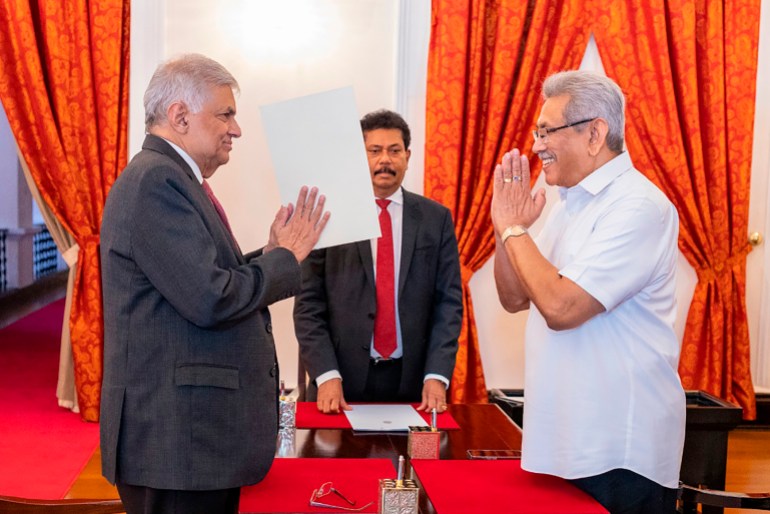I can turn around Sri Lanka’s economy: PM Ranil Wickremesinghe
Sri Lanka’s newly appointed prime minister says it will take one and a half years to stabilise the crisis-hit economy.
Colombo, Sri Lanka – Ranil Wickremesinghe, the newly appointed prime minister of crisis-hit Sri Lanka, has said he is confident he can turn the economy around – but cautioned it will take 18 months before stability returns.
“The year 2023 is going to be difficult, but by 2024 things should pick up,” Wickremesinghe told Al Jazeera last week [Thursday] in a wide-ranging interview at his official residence in the capital, Colombo.
The 73-year-old leader, who in May became prime minister for the sixth time, said that he took up the job under extraordinary circumstances.
“We had nearly two days without a government; things were getting out of hand,” he said, recalling the mass protests over shortages of fuel and electricity that forced Mahinda Rajapaksa, his predecessor and the brother of President Gotabaya Rajapaksa, to resign.
“I thought ‘the situation is bad, it’s your country, so you can’t be wondering whether you are going to succeed or not. You take it over and work to succeed,’” said Wickremesinghe, who met the president at the request of some MPs from the ruling Sri Lanka Podujana Peramuna party.
“I have confidence I can turn the economy around,” he said.
The island nation of 22 million has been brought to a virtual standstill due to acute shortages of fuel and essential items such as food and medicines, as the government ran out of foreign reserves to import commodities earlier this year.
Sri Lanka defaulted on its external debt in April and the usable foreign reserves are so low that it has struggled to cover its needs from the international market.
In Colombo, the roads are nearly empty. Some long queues can be seen near the few petrol stations that are still open, but educational institutions, businesses and government offices remain shut. Hotels in the capital – once full of tourists – are struggling to stay afloat due to a sharp drop in guests.
Worst crisis since independence in 1948
Wickremesinghe, who has been tasked with lifting the country out of its worst crisis since independence in 1948, said there will be petrol shortages until at least July 22, when the next shipment is expected.
“We are buying fuel either using Indian credit lines or the foreign exchanges that we get from remittances. It’s [remittances] a small amount, but nevertheless, sometimes we get a billion dollar[s] or a billion and a half. The rest of the reserves from what we got from the creditors have already been busted,” he said.

Food inflation has risen to nearly 60 percent, while the crashing of the Sri Lankan rupee by more than 80 percent since March has further eroded people’s purchasing power.
Last month, the prime minister said the economy had “collapsed”.
“It’s a big setback to the economy and caused lot of hardship to the people … We have been taking steps … especially to get gas, which will be available in the next few days,” he told Al Jazeera, adding supplies of diesel and furnace oil have also been made.
“The issue has been petrol … and that will take a bit of time.”
Furthermore, the prime minister added that a gas deal has been secured, with most of the funding coming from the World Bank, which will ensure supplies for the next four months.
No comments:
Post a Comment